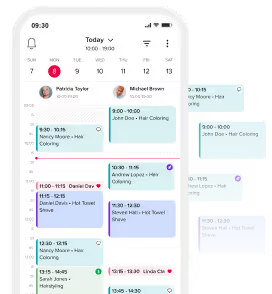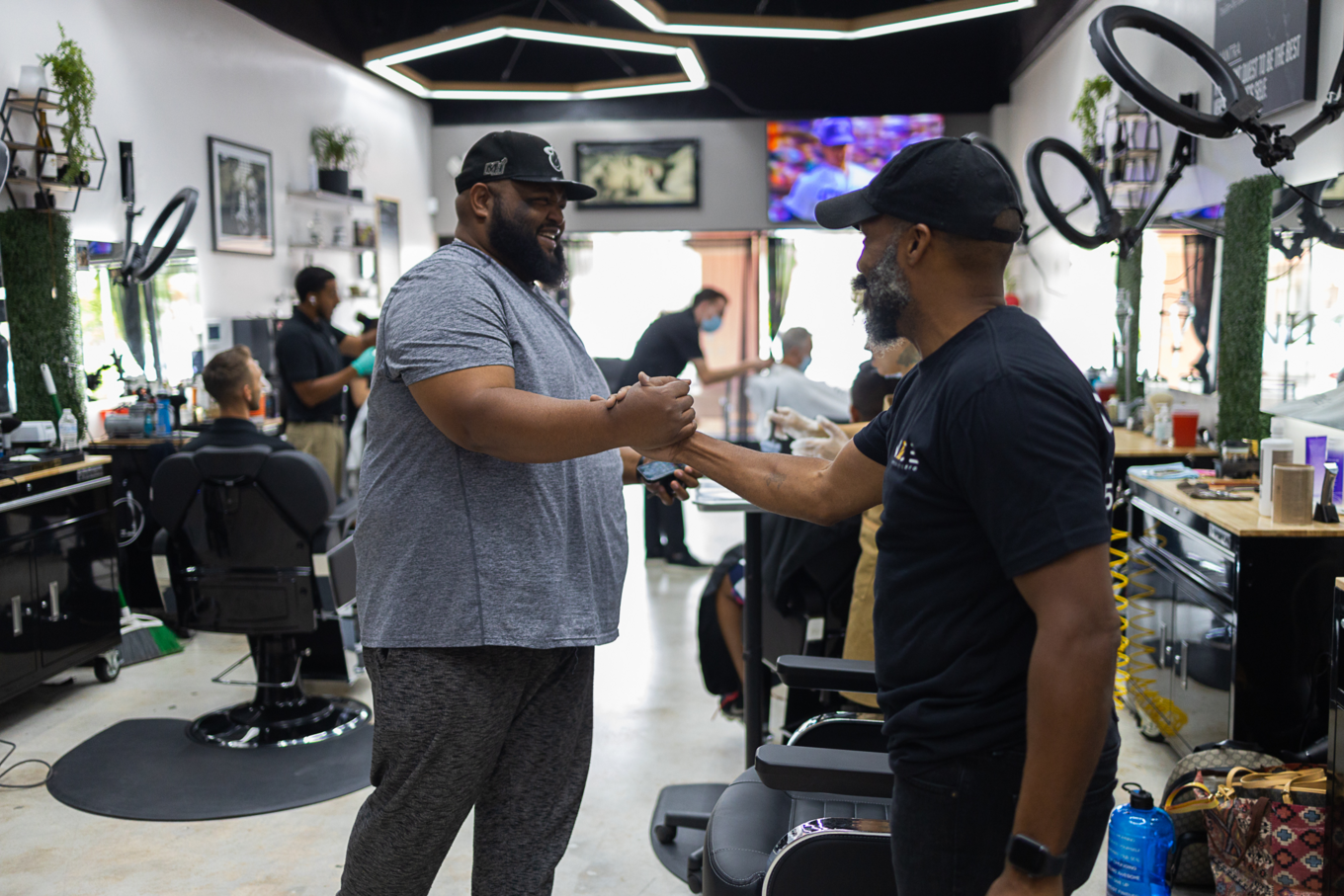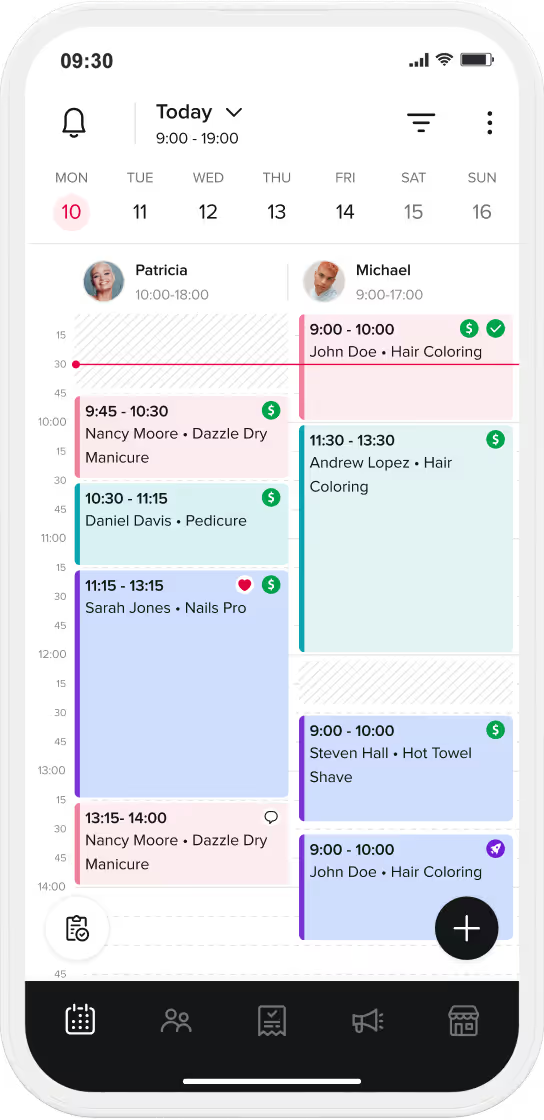

Barbering is more than a trade; it's an art that brings people together and helps shape the community. For barbers and shop owners, it's about blending a passion for style with the reality of making a living. And that's where a big question pops up: Can you really turn this passion into profit?
When it comes to making your barbershop thrive, it’s about more than just the cuts you offer; it's about knowing your numbers. From what comes into what goes out, managing your money is as crucial as the services you provide. We're here to guide you through the expenses like insurance and utilities and help you strike that sweet spot between costs and profits.
Curious about what it takes to open and run your own shop? Click here to uncover the details in our latest blog post. It's all about setting you up for success with the right tools and insights.
But for now, let’s get into the nitty-gritty of what being a barber is all about—beyond the haircuts and the small talk. We're talking about the real stuff: the earnings, the satisfaction of being your own boss, and yes, the challenges too.
Barbers are truly shaping up the future, and it's not just with the snip of their shears. Beyond the classic cuts, there's a growing appetite for more specialized services like hair coloring and straightening, and it's these offerings that are keeping the buzz alive in the barbering business.
In the face of competition from niche beauty service providers, barbershops continue to flourish. Data from ZipDo show that the U.S. barbering landscape is thriving, with over 220,000 barbershops that have seen a growth of 1.4% in 2021. The Southwest, in particular, is a cut above the rest, hosting nearly one-third of all U.S. barbershops.

On the financial front, the average barbershop is cashing in approximately $73,500 annually. The entire men’s grooming market, which includes these bustling barbershops, is projected to grow to a robust $81.2 billion by 2024.
In terms of employment, ZipDo's statistics suggest barber jobs are expected to grow by 8% from 2022 to 2032, outpacing many other sectors. With around 89,000 job openings forecasted each year due to barbers retiring or changing careers, the opportunities for new and existing barbers are looking sharp.

Just like the diverse array of styles they craft, a barber's earning potential can range just as widely. It's swayed by so many factors — where they’re based, who sits in their chair, the hours they put in, and even the way they earn their income. To get to the heart of “How much does a barber make?”, we've got to sift through national averages and recognize that earnings can vary as much as the individual barbers themselves.
Trusty data from the U.S. Bureau of Labor Statistics, which is the go-to federal resource for labor economics and statistics, tells us that the median wage for barbers in May was $18.73 per hour. To break it down, this means that half of all barbers earned more, while the other half earned less. Looking at the broader spectrum, the lower 10 percent of earners made under $13.35 per hour, but those in the top 10 percent managed to bring in over $37.71 per hour.
For a side-by-side comparison, hairdressers, hairstylists, and cosmetologists made a median of $16.95 per hour around the same time, with the spread of earnings being somewhat similar to barbers.
Now, barbers aren't just artists of the trade; they’re often savvy business folks, too. Many work full-time, with part-time gigs also common in the mix. Their hours can stretch into evenings and weekends — the prime time for a buzz in the barbershop. For the self-starters who run their own place, days can be long but rewarding, especially since they have the perk of setting their own schedule.
Before we snip this section off, it’s clear that while a barber’s earnings can vary, the dedication to the craft and the flexibility of the profession can weave together a fulfilling and profitable career.
Navigating the financial landscape of a barbershop brings us to the big question: What's the typical annual take for a barbershop? The truth is, it's not a one-size-fits-all answer. A barbershop's yearly revenue ebbs and flows with various factors — the hustle and bustle of its location, the steady stream of clients walking through the door, and the array of services it offers from classic cuts to the latest trends.
On average, a barbershop's yearly revenue swings between $100,000 to $200,000. Yet, this is more than just numbers. It reflects the story of a community hub that grows with every haircut, every conversation, and every satisfied customer who walks out feeling like their best self.
This estimate also underscores the importance of savvy business practices — such as effective appointment scheduling, dynamic service offerings, and local market understanding — all key strands in the braid of a successful barbershop business. And, with the right tools and community support, even these averages can be surpassed, creating a thriving hub of style and connection.
Remember, these figures are starting points. With dedication, a finger on the pulse of the latest trends, and a commitment to excellence, the growth potential is as vast as the variety of styles that barbers masterfully create every day.
-min.jpeg)
Per state in the USA, Talent.com reveals a range of yearly salaries for professionals—keep in mind, these figures can vary
Launching a new barbershop is much like crafting a new hairstyle: it requires vision, precision, and the right tools to bring clients in and keep them coming back. One of the most effective strategies for growth is leveraging technology to understand and cater to your client base.
Imagine having a dashboard that paints a complete picture of your client's preferences, booking patterns, and feedback. That's where an online booking software like Booksy becomes an invaluable partner. By syncing data from your social media buzz, online reviews, and the intuitive Booksy platform, you're not just gathering information; you're curating an experience tailored to each client.
With Booksy, it's about smart engagement. Segmenting your clientele is a breeze, allowing for refined communication strategies. Picture this: identifying clients who haven't graced your chairs in a few months and enticing them back with a targeted Message Blast offering a trim or a hot towel shave. Or, crafting bespoke offers for your regulars who value that extra touch of personalization. This isn't just customer service; it's customer connection.
Remember, every snippet of data is a golden thread in the broader narrative of your business growth. Manually, these efforts could consume hours you don't have to spare. With Booksy, automation meets personalization, ensuring you spend less time on the books and more time with the clippers—furthering that mission to not just attract new faces, but to create a loyal community around your chair.

Navigating the financial currents of a barbershop business brings us to one pivotal indicator of success: the percentage of repeat clients. This isn't just a number; it's a direct reflection of a shop's vitality and a beacon of profitability. Typically, a thriving barbershop will see about 60-70% of customers who are not mere passersby but loyal patrons.
This loyalty speaks volumes about the business's health and is a testament to the quality of service provided. It’s a narrative interwoven with the financial tapestry we've discussed so far. Each return visit is more than a nod to your expertise; it's a contribution to the shop's annual revenue and a stepping stone to its long-term prosperity.
Elevating your barbershop's revenue can be as creative and personalized as the styles you carve out every day. It's about offering more than just a cut—it's about providing a complete experience. Here's how you can broaden your horizons and give your earnings a boost
Introduce a suite of extra services that complement your cuts. Think about stress-busting head massages, precise beard trimming, or even educational sessions where you teach the fine art of at-home styling. These add-ons not only enhance the client experience but also add new lines to your revenue stream.
Your expertise in hair and beard care positions you perfectly to advise on the best products. Capitalize on this by offering a handpicked selection of shampoos, oils, and balms right at the point of service. This not only makes it convenient for your clients but also turns your shop into a one-stop grooming haven.
Create a line of merchandise that resonates with your brand. Whether it's sleek aprons, custom combs, or even branded apparel, merchandise can turn your clients into ambassadors for the unique vibe of your barbershop.
Enhancing your barbershop's revenue is an ongoing journey of discovery—one that reflects the evolving needs and tastes of your clientele. By offering these tailored services and products, you're not just cutting hair; you're crafting an experience that keeps clients returning, wallets in hand, ready for the unique touch that only your barbershop can provide.

In a recent New York Times feature, the spotlight shone on Mr. Marcus Harvey, a distinguished barber to the stars, whose entrepreneurial spirit exemplifies just how lucrative the art of barbering can be. With a roster of celebrity clients, educational workshops aimed at empowering other barbers, and savvy partnerships with brands like Bevel, Harvey's income reaches an impressive $500,000 a year.
Also featured was Vince Garcia, a Los Angeles-based barbershop owner and entrepreneur, who taps into the city's vibrant potential for celebrity clientele. With a pricing structure that includes $100 in-house cuts and $350 house calls, along with lucrative brand partnerships, including one with Dior, Garcia's annual income stands at around $250,000.
These narratives aren't just success stories; they're blueprints for diversification and brand-building in the barbering industry. Whether it's expanding into education, leveraging social media for brand endorsements, or exploring higher-tier services, these examples illuminate paths to financial growth that extend well beyond the chair.
For professionals looking to mirror such success, Booksy provides the tools to manage and expand your business efficiently. Our platform can streamline your scheduling, amplify your brand presence, and provide the digital infrastructure necessary to build and scale your business toward the kind of diverse revenue streams that Harvey and Garcia exemplify.
So, what's the final word on the buzz around barbering profits? It's looking sharp. The numbers don't lie—there's growth on the horizon, and it's more than just a few percentage points. We're talking real opportunities for those ready to blend traditional skills with a dash of modern business savvy.
Sure, being a barber is about the craft, the culture, and those crisp fades. But let's not forget, it's also your gig, your livelihood. And with an industry that's showing healthy growth and an ever-loyal clientele, it's fair to say that the financial side of things can be just as satisfying as that feeling of nailing the perfect cut.
Now, let's not sidestep the digital dance that's shaking up the scene. Tools like Booksy? They're like your silent business partner, handling the books while you handle the buzzers. Scheduling, customer management, reminders? Check, check, and check. All sorted with a few taps on a screen, so you can keep those chairs filled and the cash register humming.
In the grand scheme of things, it’s not just about how much you can earn, but how you earn it. Create a space where customers feel valued, offer services that keep 'em coming back, and embrace the tech that takes the hassle out of hustling. Do that, and you’re not just cutting hair, you’re growing a thriving business.
And that's the straight razor truth—barbering can be as profitable as you're willing to make it. So gear up, stay sharp, and let's cut to the chase of success together.
According to the U.S. Bureau of Labor Statistics, the median wage for barbers in May was $18.73 per hour.
Barber jobs are expected to grow by 8% from 2022 to 2032, which is a faster rate than many other sectors.
The typical yearly revenue for a barbershop generally swings between $100,000 to $200,000.
A thriving barbershop typically sees about 60–70% of customers as loyal patrons, which is a direct reflection of the shop's financial health and vitality.
Owners can improve revenue by expanding the service palette (e.g., head massages, beard trimming) and by curating a retail niche (selling products like oils, balms, and shampoos).
Booksy helps by providing a complete picture of client preferences and booking patterns. It allows the shop to segment clientele and send targeted communication (like an offer to entice lapsed clients) to create a loyal community.
High-end barbers diversify by expanding into educational workshops, securing lucrative brand partnerships (e.g., Dior, Bevel), and leveraging social media for endorsements, extending income beyond the chair.

